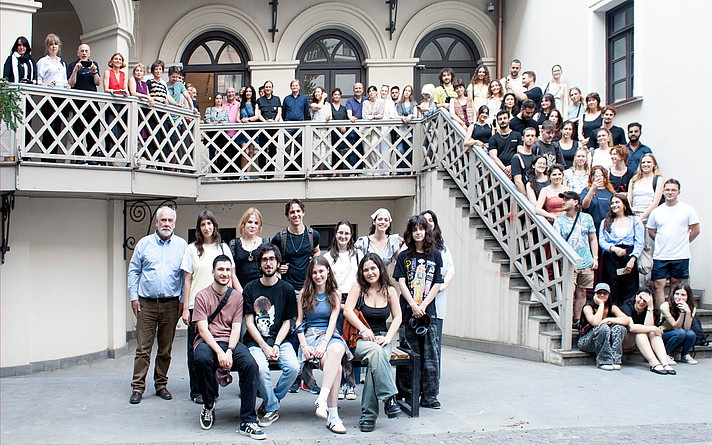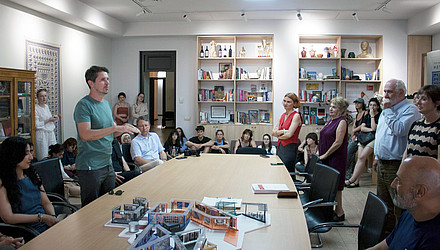As part of the Erasmus+ programme, there is a separate funding line called Key Action (KA) 171 for mobility outside Europe and the EU. Since 2015, this has enabled students and university staff to participate in worldwide mobility programmes. The Salzburg University of Applied Sciences has been very successful in the current 2025 application round: all projects submitted in all regions and countries have been approved by the National Agency (OeAD), with a total funding amount of around 500,000 euros.

The Salzburg University of Applied Sciences is taking the opportunity offered by the current Erasmus+ programme call for proposals to intensify partnerships with existing universities through projects and to establish new partnerships with universities outside the EU – in so-called third countries. The aim is to strengthen international exchange, promote joint projects and further develop the intercultural competence of students and staff.
Central to internationalisation
‘KA171 is a key instrument for our internationalisation strategy,’ emphasises Annette Schatzmann, Head of the International Office. ‘Cooperation with universities outside Europe in particular opens up new perspectives for teaching and research.’
In addition to expanding existing collaborations, the focus is also on new strategic partnerships. The FH plans to expand its activities in regions such as sub-Saharan Africa, South-Eastern Europe and South-East Asia. Particular emphasis will be placed on sustainable and inclusive mobility formats – for example, through targeted support for participants with fewer opportunities.
Funding from the European Commission creates a framework for establishing and expanding strategic partnerships outside Europe and the EU and enables cross-border cooperation. These partnerships lay the foundations for projects and short- and long-term mobility programmes. Joint study programmes, such as double degrees, also arise from in-depth exchanges, which are usually maintained by both sides over a period of years.
Georgia and South Africa: examples of cross-cutting cooperation

There have already been successful KA171 projects at the Salzburg University of Applied Sciences in recent years. One example of this is the collaboration with Georgia: the partnership is based on joint projects between the Design & Product Management degree programme and the Tbilisi State Academy of Art (TSAA). Every year, around 10 students from Georgia take part in the International Design Workshop. In turn, a group of students from the Salzburg University of Applied Sciences – accompanied by lecturers – spent a week in Georgia to take part in a workshop.
These experiences not only broaden perspectives across countries and institutions, but also shape personal experiences.
‘For some participants, the visit to the Kuchl campus led to the decision to spend a semester abroad at the Salzburg University of Applied Sciences or even to continue with a master's degree,’ reports Jennifer Simon from the International Office, who accompanies the individual projects from application to implementation.
Another example is the cooperation with the partner university University of the Free State (UFS) in South Africa: the funding enables South African students to study or stay at the Salzburg University of Applied Sciences.
Pictures: International workshop in Georgia, cooperation talks in Kosovo and Stellenbosch/Africa.
Erasmus+ KA171: Overview of FH Salzburg projects (2025–2028)
- Kosovo: University of Applied Sciences Ferizaj
- Georgien: Tbilisi State Academy of Arts
- Israel: Holon Institute of Technology, Bezalel Academy of Arts and Design
- Südafrika: Stellenbosch University, University of the Free State
- Namibia: Namibia University of Science and Technology
- Taiwan: National Taipei University of Technology
With total funding of around €500,000 and 128 approved mobility projects for the three-year project period, FH Salzburg ranks first among all applicants in Austria in this application round. ‘The amount of the approved budget is extremely gratifying. The feedback from the National Agency on the applications has also been very positive,’ says Jennifer Simon, reporting on the successful conclusion of the funding round, adding: ‘A big thank you goes to the application writers from the degree programmes and departments. We would also like to thank the National Agency for its extensive support as an interface with the EU Commission.’
With the expansion of the KA171 projects, the Salzburg University of Applied Sciences is underlining its commitment to an open, networked and future-oriented academic world.

Funded by the European Union.
However, the views and opinions expressed are solely those of the author(s) and do not necessarily reflect those of the European Union or OeAD-GmbH. Neither the European Union nor OeAD-GmbH can be held responsible for them.
